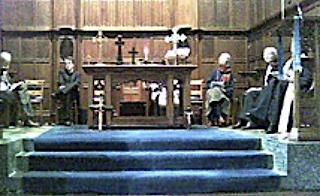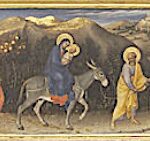Homily of Pope Francis
Solemnity of the Conversion of St. Paul the Apostle – Second Vespers
Basilica of Saint Paul Outside the Walls – Saturday, 25 January 2025
Also 58th Week of Prayer for Christian Unity
1st Letter of St. Paul to the Corinthians 15, 9-10
9 For I am the least of the apostles, unfit to be called an apostle, because I persecuted the church of God.
10 But by the grace of God I am what I am, and his grace toward me was not in vain
and John 11. 17-27
17 Now when Jesus came, he found that Lazarushad already been in the tomb four days.
Bethany was near Jerusalem, about two miles off, and many of the Jews had come to Martha and Mary to console them concerning their brother.
When Martha heard that Jesus was coming, she went and met him, while Mary sat in the house.
Martha said to Jesus, “Lord, if you had been here, my brother would not have died. And even now I know that whatever you ask from God, God will give you.”
Jesus said to her, “Your brother will rise again.”
Martha said to him, “I know that he will rise again in the resurrection at the last day.”5
Jesus said to her, “I am the resurrection and the life; he who believes in me, though he die, yet shall he live, and whoever lives and believes in me shall never die. Do you believe this?”
She said to him, “Yes, Lord; I believe that you are the Christ, the Son of God, he who is coming into the world.”
Jesus arrives at the home of his friends Martha and Mary four days after the death of their brother Lazarus. Having apparently lost all hope, Martha’s first words express her grief and her regret that Jesus had arrived too late: “Lord, if you had been here, my brother would not have died” (Jn 11:21).
At the same time, however, Jesus’ presence kindles the light of hope in Martha’s heart and leads her to a profession of faith: “But even now I know that God will give you whatever you ask of him” (v. 22).
It is an attitude that always leaves the door open, never closed!
Jesus speaks to her about the resurrection of the dead not only as an event that will take place at the end of time, but as something that is already present, because he himself is the resurrection and the life.
And then he asks her a question: “Do you believe this?” (v. 26).
Thisquestion is also addressed to us, for you, for me: “Do you believe this?
Let us consider the same question: “Do you believe this?” (v. 26).
It is a brief but challenging question.
This tender encounter between Jesus and Martha in the Gospel teaches us that even in times of despair, we are not alone and that we can continue to hope.
Jesus gives life even when it seems that all hope has disappeared.
Hope can falter after difficult experiences such as a painful loss, an illness, a bitter disappointment or a sudden betrayal. Although each of us may experience moments of despair or know people who have lost hope, the Gospel tells us that Jesus always restores hope by raising us from the ashes of death.
Jesus always lifts us up and gives us the strength to go on, to begin again.
Dear brothers and sisters, let us never forget that hope never disappoint! Hope never disappoints!
Hope is like a rope anchored to the shore to which we cling to; it never disappoints.
This is also important for the life of Christian communities, our churches and our ecumenical relationships.
Sometimes, we are overwhelmed by fatigue and discouraged by the results of our labors.
It can even seem that the dialogue and the efforts made on both sides are hopeless, almost doomed to failure.
All of this makes us experience the same anguish as Martha, but the Lord comes to us.
Do we believe this? Do we believe that He is the resurrection and the life?
Do you believe that He rewards our efforts and always gives us the grace to continue our journey together? Do we believe that?
This message of hope is at the heart of the Jubilee we have begun.
The Apostle Paul, whose conversion to Christ we commemorate today, told the Christians of Rome, “Hope does not disappoint us, because God’s love has been poured into our hearts by the Holy Spirit who has been given to us” (Rom 5:5)
We have all received the same Spirit, all of us, and this is the foundation of our ecumenical journey.
The Spirit guides us on this journey. There are no practical things to help us understand it better.
No, there is the Spirit, and we must follow the Spirit’s guidance.
58th Week of Prayer for Christian Unity
May the unity we all are searching for be found.
The Jubilee Year of Hope celebrated by the Catholic Church coincides with an anniversary of great significance for all Christians: the 1700th anniversary of the first great ecumenical council: the Council of Nicaea.
This Council sought to preserve the unity of the Church at a very difficult time, and the Council Fathers unanimously approved the Creed that many Christians still recite every Sunday at the celebration of the Eucharist.
This Creed is a common statement of faith that transcends all the divisions that have divided the Body of Christ over the centuries.
The anniversary of the Council of Nicaea is therefore a year of grace, an opportunity for all Christians who recite the same Creed and believe in the same God.
Let us rediscover the common roots of the faith; let us preserve unity! Let us always go forward!
What comes to mind is something that the great Orthodox theologian Ioannis Zizioulas used to say:
“I know the date of full communion: the day after the Last Judgment!”
In the meantime, we must walk together, work together, pray together, love together.
And that is something very beautiful!
Dear brothers and sisters, this faith that we share is a precious gift, but it is also a task.
The anniversary should be celebrated not only as a “historical memory”, but also as a commitment to bear witness to the growing communion among us.
We must be careful not to let it slip away, but rather to build solid bonds, to cultivate mutual friendship, and be instruments of communion and fraternity.
During this Week of Prayer for Christian Unity, we can also draw from the anniversary of the Council of Nicaea a call to persevere in the journey toward unity.
This year, the celebration of Easter coincides in both the Gregorian and Julian calendars, a circumstance that proves providential as we commemorate the anniversary of the Ecumenical Council.
I renew my appeal that this coincidence may serve as an appeal to all Christians to take a decisive step forward towards unity around a common date for Easter (cf. Bull Spes Non Confundit, 17).
The Catholic Church is ready to accept the date that everyone wants: a date of unity.
I am grateful to Metropolitan Polycarp, representing the Ecumenical Patriarchate, to Archbishop Ian Ernest, representing the Anglican Communion who is concluding his valuable service for which I am very grateful – I wish him well as he returns to his homeland – and to the representatives of other Churches who are participating in this evening’s sacrifice of praise.
It is important to pray together, and your presence here this evening is a source of joy for everyone.
I also greet the students sponsored by the Committee for Cultural Collaboration with the Orthodox and the Oriental Orthodox Churches of the Dicastery for Promoting Christian Unity, the students from the Ecumenical Institute of World Council of Churches in Bossey and the many other ecumenical groups and pilgrims who have come to Rome for this celebration.
I am grateful to the choir, who gave us with a very beautiful atmosphere for prayer.
May each of us, like Saint Paul, find our hope in the Son of God made man and offer it to others where hope has been lost, where lives have been broken or where the heart is overwhelmed by adversity.
Hope is always possible in Jesus. He also sustains our hope as we journey towards him in unity.
And so we return again to the question that Martha was asked and that we are asked this evening:
“do you believe this?”.
Do we believe in communion with one another? Do we believe that hope will not disappoint?
Dear sisters and brothers, this is the time to reaffirm our profession of faith in the one God and to find in Christ Jesus the way to unity.
As we wait for the Lord to “come again in glory to judge the living and the dead” (Nicene Creed), let us never grow tired of bearing witness, before all peoples, to the only-begotten Son of God, the source of all our hope.


